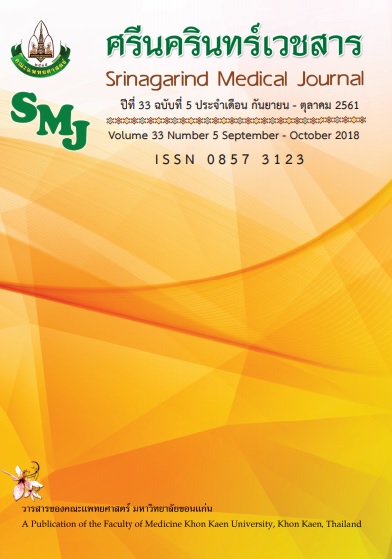Assessment of Knowledge in Cancer Patients Undergoing Chemotherapy at Udon Thani Hospital
Keywords:
chemotherapy knowledge; chemotherapy; cancer patient; adverse eventsAbstract
Background and objective: Understanding of cancer patients on chemotherapy, adverse events and management approaches are important to healthcare providers in the patient care plan. This study aimed to assess the knowledge in cancer patients undergoing chemotherapy.
Methods: This was a prospective, descriptive study in cancer patients receiving chemotherapy in the Day care unit, Udon Thani Hospital during 1 October to 30 November 2012. A 20-question evaluation form was used. The total score was 20 points, covering 3 aspects: cancer and chemotherapy (4 points), chemotherapy adverse reaction (6 points) and management (10 points).
Results: There were 100 patients with mean scores of 3 items of 15.49 ± 2.56. It is divided into the areas of cancer and chemotherapy knowledge, chemotherapy adverse reactions and management were 3.36 ± 0.64, 4.53 ± 1.17 and 7.6 ± 1.60, respectively.
Conclusion: Overall, patients have a good understanding of cancer chemotherapy. However, the knowledge score in chemotherapy adverse reaction was less than the other aspects.
References
2. งานทะเบียนมะเร็ง ศูนย์มะเร็ง อุดรธานี.รายงานอุบัติการณ์โรคมะเร็ง ประชากรของจังหวัดอุดรธานี ปี 2550-2552: 1-73.
3. Medina PJ, Fausel C. Cancer Treatment and Chemotherapy. In: JT DiPiro, Talbert RL, Yee GC, Matzke GR, Wells BG, Posey LN, editors. Pharmacotherapy A Pathophysiologic Approach 7th edition, United States of America, McGraw-Hill; 2008.
4. DeVita VT Jr, Chu E. A History of Cancer Chemotherapy. Cancer Res 2008; 68: 8643-53.
5. Subongkot S, Srisawat S, Pratheepawanit Johns N, Sookprasert A. Outcome of Chemotherapy Counseling in Oncology Patients by Pharmacist. IJPS 2009; 5: 34-45.
6. Kawin-atichart S, Weeraprasit P, Sookprasert A, Chanthawong S. The application of telephone call back to survey the incidences of adverse drug events of ambulatory oncology patients. IJPS 2013; 9: 30. (Abstract No. P1-PP-30)
7. Karomprat A, Chaichan P, Santawesuk U, Sookprasert A. Symptoms, Symptom Management and Outcome in Cancer Patients Undergoing Chemotherapy. Srinagarind Med J 2017; 32: 326-31.
8. Schnipper JL, Kirwin JL, Cotugno MC, Wahlstrom SA, Brown BA, Tarvin E, et al. Role of Pharmacist Counseling in Preventing Adverse Drug Events After Hospitalization. Arch Intern Med 2006; 166: 565-71.
9. Ream E, Richardson A. The role of information in patiens' adaptation to chemotherapy and radiotherapy : a review of the literature. Eur J Canc Care 1996; 5: 132-8.
10. Saransate R, Soorapan S, Pattharachayakul S, Pratheepawanit Johns N. Effects of pharmacist counseling for lymphoma patients at Songklanagarind Hospital: A Randomized. Songkla Med J 2006; 24: 407-17.
11. Prisutkul A, Sukuntapan M, Arundon T, Ruangdam A, Dechaphunkul A, Sunpaweravong P. Efficacy of Chemotherapy Education Programs on Knowledge Gain and Anxiety Reduction in Cancer Patients: A Prospective Study Comparing a Novel Multi-media Education Tool with a Conventional Program. Thai Cancer J 2011; 31: 125-36.




